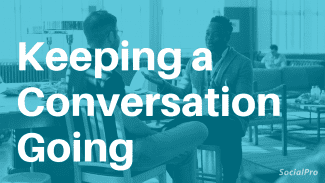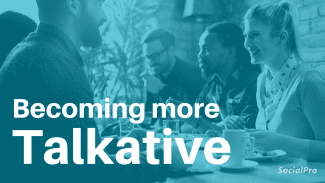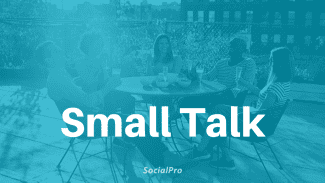We’ve all done it from time to time. We’re involved in a conversation, and, for some reason, we just zone out. It might be for a few seconds or even a few minutes, but it can really give you a jolt when you realize that you have no idea what the other person was just saying.
Why do I zone out?
Zoning out when someone is talking to you happens when you’re not giving enough attention to the conversation. This can be because the topic isn’t interesting, you’re worrying about something else or there is a distraction. It can also be a symptom of some disorders, such as anxiety, autism or ADHD.
Blanking out like this can have real consequences for your social life. Other people can often tell when we have trouble paying attention and quickly become frustrated or annoyed. I’m going to offer you some of the causes of blanking out during conversations and give you practical tips on how to focus when someone is talking to you.
Here’s why you might zone out when someone is talking to you:
1. You get wrapped up in your own head
You probably know this feeling. You’re having a conversation, and you suddenly start worrying about how you’re coming across. You might wonder whether you’re making enough eye contact, too much eye contact, whether you’re standing too near or too far away. All of your focus is on yourself, and you realize that you haven’t been following the conversation.
Work on active listening
Paying attention to how you come across to others is important to develop your social skills, but not at the expense of being involved in the conversation. Active listening is where you really pay attention to the other person.[1] Try paraphrasing what the other person has said to check that you understand. You could say, “So, it sounds like…”
When you start to worry about how you’re coming across, try reminding yourself that listening is an important social skill. You could say to yourself, “I don’t know whether I have those things right, but if the other person knows I’m listening, I’ve got one big thing right.”
2. The conversation is dragging
One thing that used to be guaranteed to have me zoning out during a conversation was when the other person took too long to make their point. I’d find myself getting frustrated and almost screaming in my head, “Just give me the short version.” The more bored I became, the harder it was to pay attention.
Work out what the other person is looking for from you
What helped me to get better at this was realizing that the other person was usually looking for something from me that I wasn’t giving. I’d understood their point in the first few seconds and had given my “I understand” signals then. I then got bored and zoned out, and they thought that I hadn’t understood. So they continued explaining… and explaining… and explaining.
Using the techniques of active listening, I now show that I understand the whole time the other person is talking. I keep eye contact, I nod, and will regularly say things like, “Yup. I totally get that.” This actually reduces the amount of time people spend explaining things to me.
3. There’s a valid distraction
I once had a job interview where there was building work going on in the next room. I deal really badly with unpredictable loud noises and, given that I was already on edge, I found it really hard to pay attention to the panel. I had to ask for questions to be repeated and felt really embarrassed and awkward.
Be honest, apologize and renew your focus
What saved the situation was being honest about the difficulty I was having. After one particularly loud noise, I said, “I’m sorry. I’m having trouble concentrating with the construction noise. I’m just going to use a notebook to help me if that’s OK?”
This showed the panel that I’d recognized my own limitations, took responsibility for them, and had a strategy to do better. If you’re zoning out because of a distraction, try using this formula:
Apologize – give context – deal with the distraction if possible – refocus.
4. You have ADHD, depression, or autism
All three of these disorders can make it difficult for you to focus on conversations. Depression can leave you easily distracted and with ‘brain fog.’[2] ADHD can make it difficult to pay attention for long stretches of time.[3] This can be exacerbated by your natural inclination to have moved on from the topic being discussed long before the other person has finished talking.
Both ADHD and autism can lead you to make novel connections and to move rapidly between different topics. Not only does this mean that you zone out, but you can also find yourself on a completely different topic from everyone else, which makes it harder for you to join back in with the conversation.
Prepare to repeat their comments back
When you’re listening to the other person, try to listen as if you’re about to be asked to repeat back everything that they’ve just said.
5. You’re tired
Being sleep-deprived makes most things more difficult, but attention is one of the mental processes that is most impacted by being too tired.[4] Being mentally or physically exhausted can leave you with ‘brain fog,’ which feels like you’re trying to think through cotton candy.
Improve your energy levels
The obvious solution to being too tired is to get a good night’s sleep, but that’s often easier said than done. Reducing caffeine intake and screen use in the evenings can help, and there are loads of other tips to help improve your sleep quality as well as quantity.
Your mental energy doesn’t just come from sleep, though. If you can’t follow a conversation due to tiredness, consider taking a short walk outside. Fresh air can dramatically improve your concentration, especially if it’s cold outside. You might also be hungry or need more exercise. Try to find solutions that restore your energy.
I should probably add that using caffeine to boost your energy levels isn’t a good solution, but that wouldn’t be completely honest. I absolutely refill my coffee if I’m struggling to stay engaged with conversations. As long as you’re also improving your energy levels through sustainable, healthy methods (such as sleep, diet, and exercise), there’s nothing wrong with a little top-up when you need it.
6. You get bored during small talk
Staying focused during a conversation is easier for some topics than others. Small talk is rarely riveting, and it can be easy to become bored and zone out. Unfortunately, other people will notice that you’ve zoned out, and you lose all the benefits of engaging in small talk in the first place. Check out our guide on what to do if you hate small talk.
Understand what small talk is for
Ignoring or resenting small talk is understandable, but it won’t help you to concentrate during conversations. Try to remind yourself that small talk is about demonstrating that you are someone people want to talk to. You are trying to show that you are interesting, caring, and trustworthy. Zoning out tells others that you’re none of these things.
When you feel your attention start to wander, try to focus on how the other person might be feeling, rather than just on the surface level of the conversation. When you understand what small talk is for, you can use this to build friendships with anyone.
7. You struggle to take in complex information
If you zone out when someone’s telling you something new or giving you detailed instructions, it might be because you struggle to learn something new through conversations or talks. There are several reasons that this might be difficult for you. For example, you might not be an auditory learner, or you might not feel comfortable showing that you don’t understand something.
Become comfortable asking questions
Not understanding something can leave you feeling awkward and embarrassed, and you might zone out to avoid that feeling. Rather than allowing yourself to disconnect, practice asking questions. Remind yourself that there’s nothing wrong with not knowing something. Knowledge isn’t the same thing as intelligence, and asking questions won’t make you look stupid. Instead, it’ll show that you’re eager to learn.
It might also help to remember that people who know a lot about a topic often struggle to explain it to others. When I’m teaching, I regularly have to tell my students that not understanding something on the first try isn’t their fault. It just means that I haven’t found the best way to teach it to them yet. If the person you’re talking to doesn’t emphasize that to you, make sure you tell it to yourself!
Ask for a diagram to help you understand
If you’re happy to ask questions but just don’t really take in information during a conversation, it might be that you’re just not an auditory learner. You might find it easier to learn through diagrams and pictures or by doing something rather than talking about it. An example of this might be that a boss or a colleague keeps giving you lots of important technical details, and you keep zoning out.
Try asking for the information to be included in an email or ask them to draw a diagram to help it make sense and keep you engaged with the discussion. If this doesn’t work, try asking the other person to pause for a moment while you make some notes. This will help your memory and can also help you focus on everything that’s being said. As a bonus, it also highlights that you’re taking what they say really seriously.
8. You’re on a device
I have to confess that I would always be on my phone, fiddling or checking things even while I was having some pretty in-depth conversations. It just seemed normal. It wasn’t until someone started doing the same thing to me that I realized just how isolating and uncomfortable it can be.
Let go of the phone and the excuses
I made every excuse I could think of as to why it was ok for me to be on my phone all the time.
- I’m good at multitasking
- I’m just trying to check something
- I run my own business. I need to stay in touch with people
- Having a mindless task in the background helps me to concentrate
- It helps me to unwind
- I can still tell you what you said, so I must have been paying attention
You might have some other excuses of your own. The thing is, no matter how good I was at multitasking or how easily I could tell the other person what they’d just been saying, I wasn’t actually paying attention to the conversation, and even more importantly, I wasn’t paying attention to the other person.
Trying to challenge each of your excuses just prompts you to make more excuses. Instead, think of it as an experiment. Practice leaving your phone in your pocket and see what difference this makes to your social interactions. Be strict with yourself during the experiment. Here are some tips I found helpful:
- Buy a watch so you’re not using your phone to tell the time
- If you want to look something up related to the conversation, suggest that the other person does it on their phone
- Consider leaving your phone in a different room
- Have set times to check your emails
- Set your phone to Do Not Disturb
If you absolutely have to use your phone, stop the conversation, explain to the other person what you’re doing and why it’s important and try to finish what you’re doing. Return to the conversation as quickly as possible. For example, you could say:
“I’m so sorry. I don’t mean to be rude, but I’m selling my house, and I’m expecting a really important email from my realtor. It won’t take a minute, and then I’ll be able to focus properly.”
9. You have anxiety or PTSD
Both anxiety and PTSD are associated with hypervigilance.[5, 6] This is where you’re constantly on the alert for danger. Anything stressful or unexpected can steal your attention away from your current conversation.
Find ways to self-soothe
Reducing your anxiety and helping yourself to feel safe is known as self-soothing. There are lots of things that you can do, so you’ll want to find what works best for you. This might be trying to stand with your back to a wall, having a drink with a strong taste that you like, or focusing on your breathing.
10. You’re distracted for no discernible reason
All of the previous examples have been explaining why you might zone out. Although these cover most situations, sometimes you can just zone out for no reason at all. You might be like one of our readers who shared this:
“I don’t know what happens. I just find myself staring at a point on the wall or a pretty tree.”
This is more common in people who find themselves daydreaming when they’re alone.
Try mindfulness training
Mindfulness training can help you to stay focused on the here and now.[7] There are different ways to go about mindfulness, but meditation, breathing exercises, and apps such as Calm or Headspace can help to guide you through the process.












